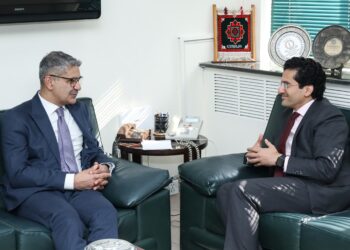ISLAMABAD: The Members of the National Electric Power Regulatory Authority (NEPRA) and the K-Electric team on Tuesday clashed over the amount and justification of write-off claims totaling Rs 68 billion over seven years.
The amount of write off claims is as follows ;(i) FY 2017, Rs 6.195 billion ;(ii) FY 2018, 3.371 billion;(iii) FY 2019, Rs 4.050 billion;(iv) FY 2020, Rs 7.492 billion;(v) FY 2021, Rs 16.040 billion ;(vi) FY 2022, Rs 14.489 billion; and (viii) FY 2023, Rs 16.264 billion.
During the public hearing, it was revealed that the power utility company had exploited loopholes regarding the duration of NEPRA’s Multi-Year Tariff (MYT) determination. One participant pointed out this weakness. On other occasions, the K-Electric team argued that they were seeking relief in line with the stipulations in NEPRA’s documents.
K-Electric representatives, including CEO Moonis Alvi and CFO Muhammad Amir Ghaziani, emphasized the financial strain caused by unpaid dues. They explained that while NEPRA’s 2018 determination allowed for a 1.69% provision for recovery losses, K-Electric had yet to receive any compensation for these losses under the MYT. Of the Rs 119 billion in bad debts recorded in its audited accounts, K-Electric requested approval for Rs 68 billion, asserting that these claims met NEPRA’s established verification criteria.
Mr. Ghaziani stated that if the write-off claims are approved by the authority, they would be adjusted into the already allocated Rs 88 billion for the financial year 2024-25. The write-off claims would become part of the tariff. However, it would be up to the government to decide how much of the impact it would absorb and how much would be passed on to consumers.
Mathar Niaz Rana, NEPRA’s Member for Finance, challenged K-Electric’s request for write-off claims from FY 2017, asking for justification of this demand. He pointed out that there was no mention in the determination allowing K-Electric to seek write-off claims for FY 2016-17.
However, K-Electric’s team argued that since no specific period was mentioned in the MYT determination, the utility company was entitled to claim unpaid amounts from consumers. A lengthy debate ensued regarding the definition of defaulters and those consumers whose connections had been severed.
Syed Moonis Abdullah Alvi, CEO of K-Electric, noted that the national recovery ratio is approximately 90%, with the remaining 10% contributing to circular debt, which has reached around Rs 2.8 to 2.9 trillion. This amount is being recovered from consumers through a surcharge that goes to the Power Holding Limited (PHL). He emphasized that K-Electric consumers had no role in circular debt but were still paying surcharges, and that the recovery gap for other distribution companies (Discos) was also being paid by Karachi consumers.
He argued, “If the write-off claims, which represent 3.6% of total recovery, are deemed prudent, they should be incorporated into the tariff.” K-Electric also stated that no-go areas in Karachi had decreased to 0.2%, and more people were opting for connections and paying their bills. However, power theft had evolved, and the company had used all available resources, including law enforcement, to combat electricity theft. The allowance for law and order issues is included in the transmission and distribution (T&D) losses.
Shahid Khaqan Abbasi, former Prime Minister and head of a 2022 Energy Task Force on K-Electric, joined the hearing. He noted that MYT had included write-off claims as part of its agenda. He mentioned that a claim of Rs 43 billion had been made for FY 2017-2022. While the Task Force found the claims to be legitimate, there were some procedural issues. The Task Force had recommended that these claims be paid.
Tanveer Barry, a representative from the Karachi Chamber of Commerce and Industry (KCCI), rejected the write-off claims. He argued that the claims would negatively affect honest consumers who pay their bills on time and are not involved in theft. He also noted that Rs 100 billion was pending from Karachi consumers due to K-Electric stay orders. According to him, Karachi consumers were paying surcharges that had no connection to K-Electric consumers, and he raised concerns over the statute of limitations for financial claims under Pakistani law. All commentators and interveners, except Rehan Jawed, objected to the write-off claims submitted by the KE.
Mr. Rehan Jawed expressed his understanding of the matter and said, “After a detailed understanding and discussion with K-Electric, I believe that if the write-off claims are not granted, K-Electric’s sustainability and investment plans will be negatively impacted. While I acknowledge that 100% recovery of these claims is not feasible in a city like Karachi, these adjustments are part of K-Electric’s tariff under the MYT framework. No additional financial burden should be placed on Karachi’s consumers. The city’s industries are already grappling with higher FCA charges, pending subsidy packages, and an unjustified PHL surcharge. Additional electricity costs could lead to widespread industrial closures. The write-off claims should be resolved as a tariff issue between the Government of Pakistan and K-Electric, and if approved, the consumers should not bear the cost through any surcharge or separate billing head.”















